- A fractional CMO for healthcare provides executive-level marketing leadership part-time, ensuring compliance, credibility, and strategic growth.
- Healthcare fractional CMOs align complex stakeholders, patients, providers, payers, and administrators through evidence-driven messaging and multi-channel strategies.
- Fractional CMO services optimize budgets, mentor internal teams, and bridge innovation with commercialization across medical devices, health tech, and provider networks.
Healthcare continues to generate remarkable innovation through new medical devices, digital health technology, and evolving care delivery models. These advances transform both provider operations and patient engagement. Yet adoption often lags behind clinical progress. The barrier is not scientific discovery but the weak connection between innovation and commercialization. Regulatory demands, payer requirements, ethical considerations, and complex decision-making environments all contribute to slower market traction, even for clinically proven solutions.
This challenge becomes clear when organizations invest heavily in research, clinical validation, and early adoption but still experience stagnant growth. Campaigns miss the mark, payers delay coverage, and referral networks fail to expand. The missing link is senior marketing leadership capable of translating complexity into actionable strategies. A fractional CMO for healthcare provides that bridge, delivering compliance-driven execution, strategic alignment, and measurable growth without the cost of a full-time executive.
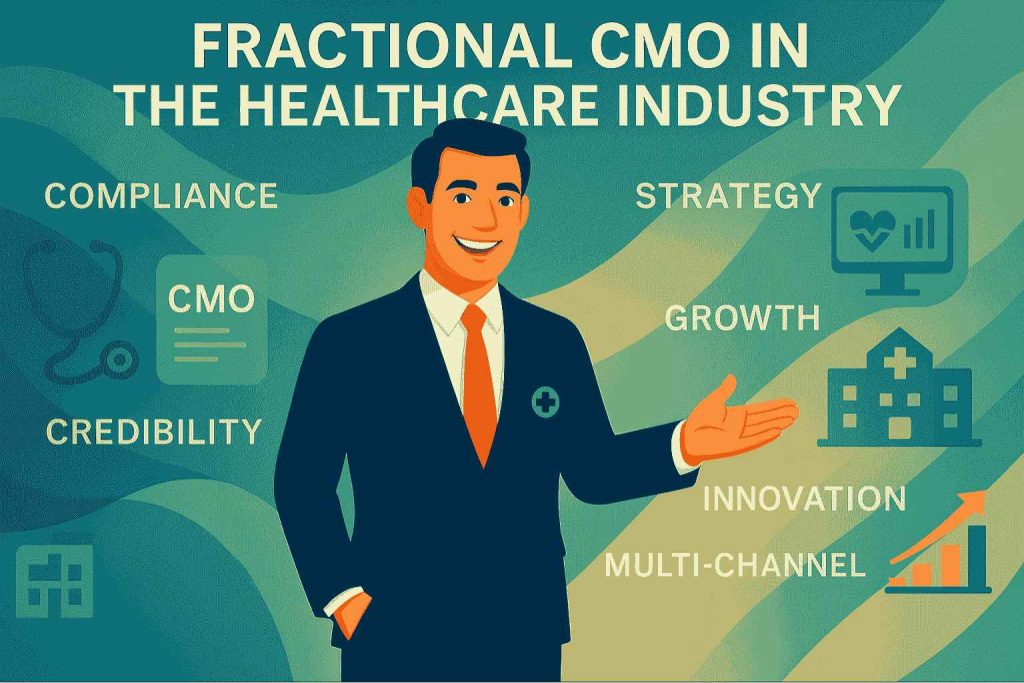
Understanding the Role of a Fractional CMO in Healthcare
Defining the CMO in Healthcare
The chief marketing officer role in healthcare differs greatly from other industries. While consumer CMOs emphasize brand awareness, acquisition, and retention, healthcare leaders face higher stakes. They must balance growth with compliance, ethics, and credibility. Success depends on navigating strict regulations while building trust with patients, providers, and payers.
Key responsibilities include:
- Aligning strategy with patient engagement, provider relations, and payer requirements
- Managing compliance with HIPAA, FDA, and CMS regulations
- Translating medical outcomes into credible, accessible messaging
- Overseeing multi-channel execution across digital, referral, and traditional marketing
A fractional CMO provides these same functions on a part-time basis, giving organizations executive-level leadership without the cost of a full-time hire.
Fractional CMO for Healthcare vs. Interim and Full-Time Models
Healthcare executives often conflate interim and fractional roles, but the distinctions are critical.
- Full-Time CMO: A permanent executive, embedded within the leadership team, responsible for long-term strategy and execution.
- Interim CMO: A temporary executive brought in during leadership transitions, mergers, or restructuring. The focus is on short-term stability and continuity until a permanent hire is made.
- Fractional CMO: A part-time executive who works strategically with leadership over months or years. The fractional model is not a stopgap; it is a deliberate structure that provides sustained strategic leadership, mentoring, and execution over time.
Unlike interim leaders who focus primarily on short-term stabilization, fractional CMOs deliver consistent, ongoing guidance that adapts to the organization’s growth and changing needs.
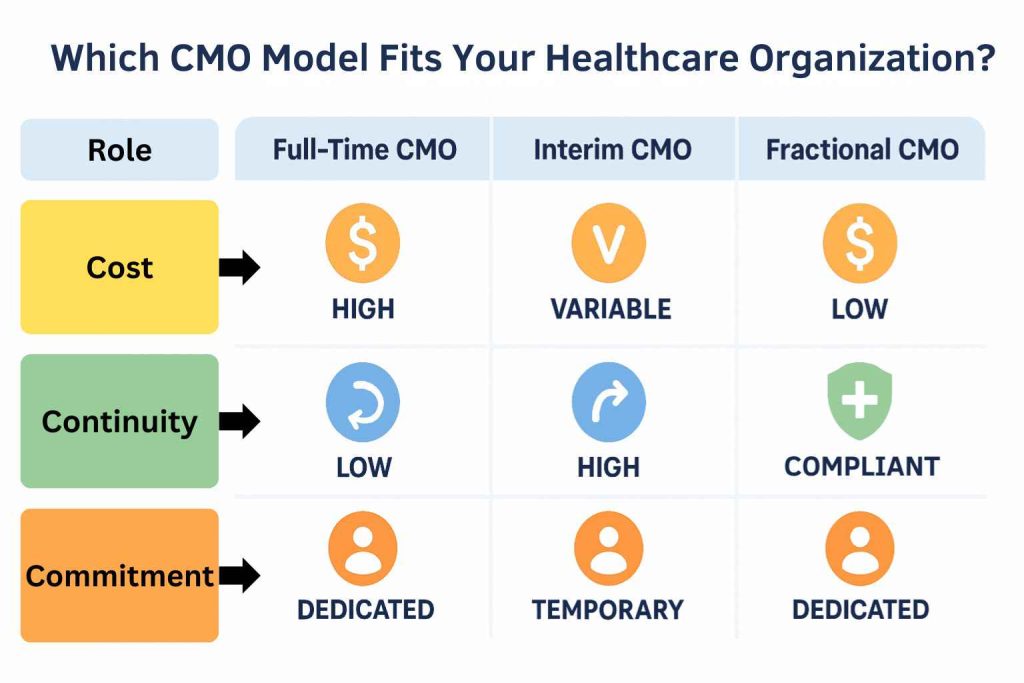
Why Healthcare Organizations Choose a Fractional CMO for Healthcare Growth
Healthcare organizations often face resource and expertise gaps:
- Startups need senior marketing leadership without the cost of a full-time executive.
- Providers may lack digital marketing expertise to connect with patients and referral networks.
- Enterprises require flexible, high-level guidance for launches, expansions, or transformation initiatives.
The benefits of engaging a fractional CMO in healthcare include:
- Strategic Alignment: Campaigns directly tied to organizational goals such as patient acquisition, referral growth, or payer alignment.
- Cost Efficiency: Access to senior expertise without the expense of a six-figure, full-time CMO salary.
- Flexibility: Engagement can scale up or down based on growth stage, funding cycles, or evolving organizational needs.
- Specialized Expertise: In-depth knowledge in areas such as medical device marketing, health tech positioning, or provider engagement that is often difficult to find in-house.
- Team Development: Fractional leaders mentor existing teams, enhancing execution while building long-term internal capacity.
Industry-Specific Challenges That Demand Senior Leadership
Regulatory Complexity
Healthcare faces intense regulatory scrutiny. FDA rules shape medical device marketing, HIPAA safeguards patient privacy, and CMS influences reimbursement communications. Over-cautious messaging weakens differentiation, while aggressive tactics risk fines and reputational damage. A fractional CMO for medical device or health tech firms ensures campaigns remain competitive, compliant, and evidence-driven.
Complex Decision-Making Ecosystems
Unlike consumer markets, healthcare purchases involve multiple stakeholders. A device purchase may require sign-off from surgeons, procurement, finance, and compliance. Digital health adoption requires buy-in from IT, clinical leadership, and CFOs. Messaging must be tailored to each.
A fractional healthcare CMO crafts multi-layered strategies:
- Providers need evidence of clinical efficacy.
- Payers require proof of cost efficiency and long-term value.
- Administrators look for workflow integration.
- Patients seek clarity, trust, and outcomes.
Trust and Credibility
In healthcare, trust is currency. Flashy branding may work in consumer markets, but here, credibility drives adoption. Case studies, peer-reviewed validation, and transparent messaging matter more than slogans. Medical marketing consultants can execute campaigns, but without executive-level oversight, they often lack cohesion. A fractional leader ensures that every initiative aligns with scientific credibility and strategic goals.
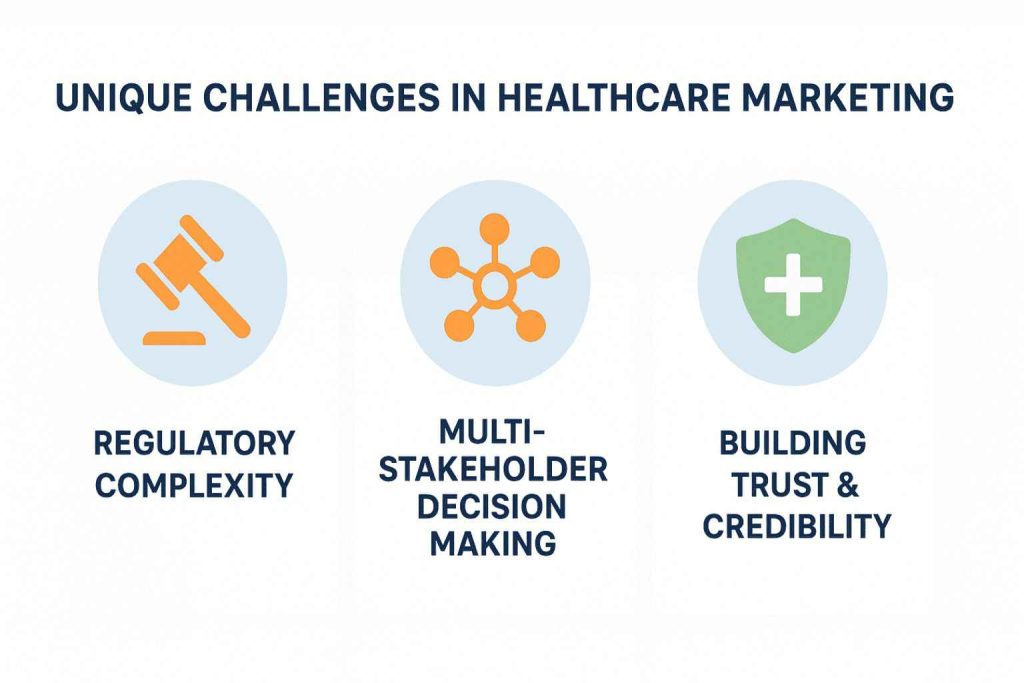
The Strategic Value of Fractional CMO Services
Strategic Alignment with Organizational Goals
A fractional CMO for healthcare ensures that marketing is not an isolated function but a driver of business results. Campaigns are directly tied to objectives such as patient acquisition, referral growth, payer adoption, and long-term brand trust. This alignment ensures every initiative advances the organization’s mission.
Compliance Without Compromise
Healthcare marketing exists under strict regulatory oversight. Fractional CMOs are experienced at navigating HIPAA, FDA, and CMS requirements, allowing campaigns to remain competitive while avoiding risk. They strike the balance between differentiation and compliance, a challenge many less-experienced consultants struggle with.
Flexibility and Scalability
Unlike full-time executives, a fractional marketing consultant in a leadership role can scale involvement up or down depending on organizational needs. Early-stage startups may need a few hours of guidance per week, while device launches or hospital rebrands may require intensive leadership. This adaptability makes the model especially relevant in healthcare, where funding cycles and strategic priorities shift quickly.
Specialized Healthcare Expertise
Fractional CMOs bring domain knowledge that generic agencies cannot replicate. Whether it is guiding a fractional CMO for medical device companies through FDA-compliant messaging or helping a fractional CMO for health tech craft payer-focused value propositions, this specialization ensures marketing efforts resonate with the right stakeholders.
Building Internal Capacity
A fractional leader doesn’t just execute campaigns; they elevate the team. By mentoring junior marketers, aligning sales teams, and reporting to executives, they leave behind a stronger internal capacity. This ensures that when an organization is ready to hire a full-time CMO, the transition is seamless and the team is already operating at a higher level of maturity.
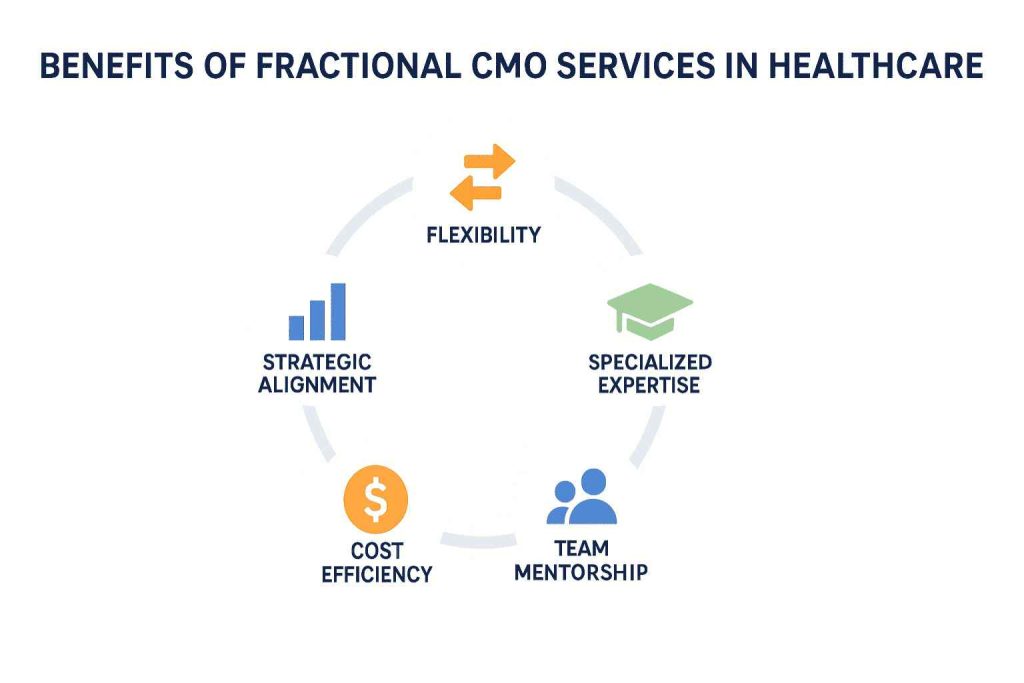
Applications of Fractional CMOs Across Healthcare Sub-Sectors
The versatility of a fractional CMO for healthcare becomes most apparent when examining the distinct subsectors within the industry. Each vertical presents its own set of challenges, and the ability to adapt strategies across them is what makes fractional leadership uniquely valuable.
Medical Devices
The medical device sector is one of the most complex marketing environments. Every stage, from clinical validation to FDA clearance to commercial adoption, requires careful alignment between innovation, compliance, and communication.
A fractional CMO for medical device companies provides clear advantages:
- Regulatory alignment: Ensures all campaigns comply with FDA advertising and promotion rules.
- Clinician-focused messaging: Develops evidence-driven narratives around efficacy, safety, and cost-benefit for surgeons and clinical teams.
- Procurement influence: Addresses hospital administrators, procurement committees, and CFOs, recognizing that purchases are multi-layered.
- Launch strategies: Orchestrates rollouts with distributor networks, medical conferences, and continuing education programs.
Without senior oversight, device companies risk being either overly cautious, leaving competitors to dominate narratives, or overly aggressive, leading to compliance risks. Fractional leadership ensures balance.
Health Technology
Health tech companies often move fast, with rapid development cycles and aggressive investor expectations. Yet their commercial strategies often lag behind their innovation. A fractional CMO for health tech helps balance disruptive ambition with market realities.
Common challenges in this space include:
- Payer adoption: Solutions must present ROI and outcomes data convincing enough to win insurer reimbursement.
- Workflow integration: Hospitals and providers resist tools that disrupt EHR systems. Marketing must emphasize seamless integration.
- Trust building: Claims of efficiency or cost reduction need validation through peer-reviewed studies or third-party endorsements.
- Market education: Many health tech firms create entirely new categories, requiring investment in educating both clinicians and patients.
Here, the fractional healthcare CMO provides discipline by aligning storytelling with adoption triggers for multiple audiences simultaneously. This prevents startups from focusing solely on technology while neglecting the payer and provider dynamics that ultimately decide adoption.
Provider Networks and Hospitals
Hospitals and provider networks operate under unique pressures related to reimbursement, patient acquisition, and reputation management. A healthcare fractional CMO plays a pivotal role in aligning brand strategy with long-term business outcomes.
Key contributions include:
- Balancing service-line marketing with overall system brand integrity.
- Segmenting campaigns differently for patients, physicians, and payers.
- Driving referrals through physician outreach while maintaining community trust.
Without strategic leadership, provider networks risk fragmented campaigns that fail to support system-wide positioning. Fractional leadership brings cohesion across service lines, digital channels, and community initiatives.
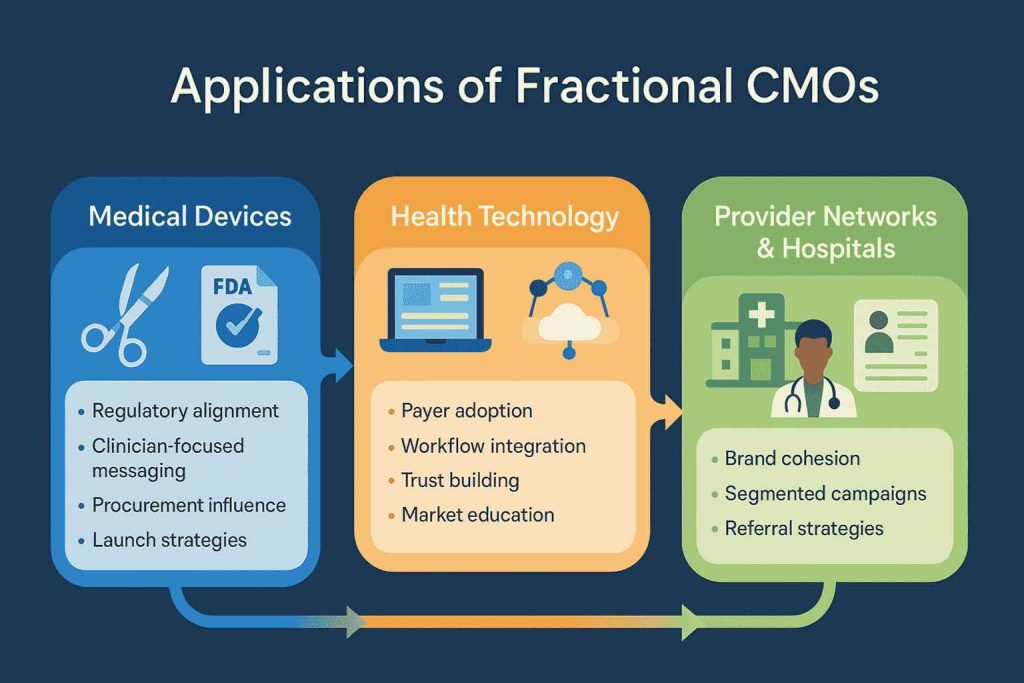
Collaboration with Consultants and Agencies
Strategic Oversight
A fractional CMO rarely operates in isolation. They coordinate healthcare marketing consultants, medical business consultants, creative agencies, and specialized firms to deliver comprehensive solutions. By setting the overall vision, a fractional CMO ensures alignment with patient acquisition, payer adoption, and brand positioning. Their leadership integrates the efforts of healthcare consulting firms. This cohesion turns fragmented initiatives into sustainable growth strategies.
Tactical Execution
External partners, whether healthcare marketing consultants, digital agencies, or creative teams, often manage campaigns, design, and outreach. The fractional CMO ensures their work remains compliant with regulations and consistent with long-term strategy.
Orchestration
Without senior leadership, external vendors may work in silos. The fractional CMO provides the connective tissue that prevents fragmentation, ensuring all channels reinforce the same message and growth objectives. This orchestration is especially valuable when coordinating complex efforts such as multichannel healthcare marketing.
Bridging Marketing and Medical Leadership
Role Distinction
The Chief Medical Officer focuses on patient safety, clinical outcomes, and regulatory adherence, while the marketing CMO (or fractional healthcare CMO) leads branding, market positioning, and growth. In some cases, a fractional chief medical officer may be engaged to provide part-time clinical leadership, while a fractional marketing leader ensures commercial strategy and compliance alignment.
Collaboration Benefits
When the two roles intersect, organizations benefit from evidence-based campaigns that maintain credibility. Clinical leadership ensures accuracy, while marketing translates complex medical data into language that resonates with patients, payers, and providers. This alignment accelerates adoption, strengthens brand trust, and ensures compliance at every stage. Such cross-functional collaboration is increasingly recognized as best practice in integrated healthcare leadership.
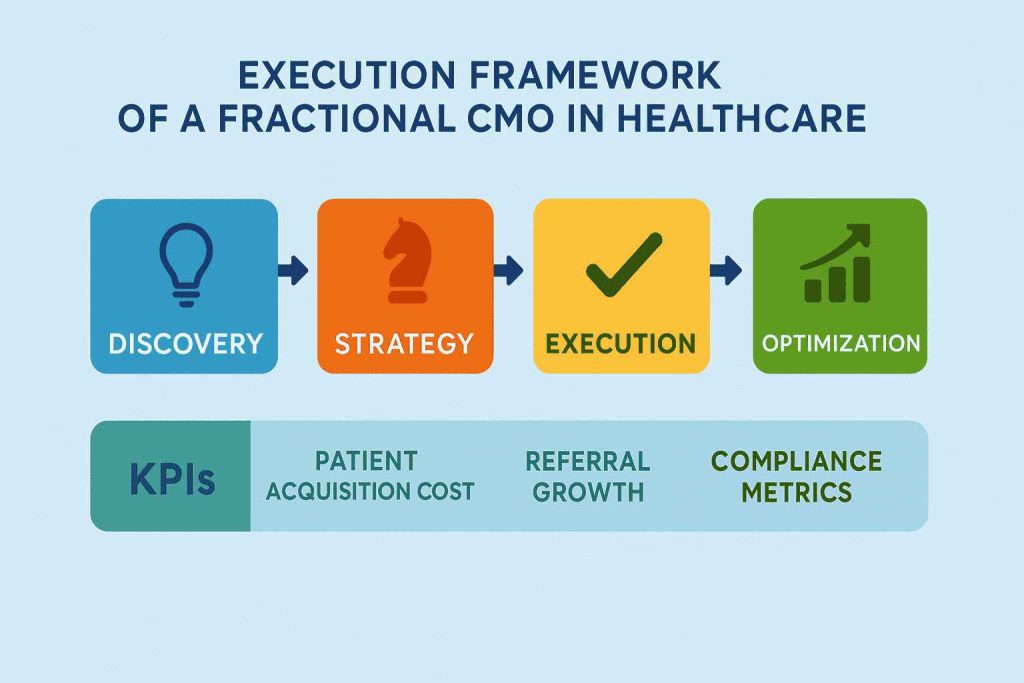
Execution Frameworks and Measuring Success
Hiring a fractional CMO for healthcare only produces results if tied to disciplined frameworks and measurable outcomes. Strong leaders bring structure to what can otherwise be fragmented initiatives.
Strategic Frameworks
Most seasoned fractional CMOs apply a phased model when entering healthcare organizations:
- Discovery and assessment: Auditing brand position, spend, competition, and operational readiness.
- Strategy formulation: Building a roadmap that balances quick wins with longer-term growth goals.
- Execution leadership: Aligning internal teams, external consultants, and agency partners around unified campaigns.
- Optimization: Continuously reallocating resources based on performance data and market response.
This approach ensures that healthcare organizations move beyond ad hoc campaigns toward sustainable growth strategies rooted in evidence and compliance.
Key Performance Indicators
In healthcare, success cannot be measured by impressions or clicks alone. CMOs track metrics that reflect financial, clinical, and reputational outcomes:
- Patient acquisition cost (PAC) compared to lifetime value.
- Referral growth from physicians and specialists.
- Market share expansion in targeted service lines or device categories.
- Brand trust scores are measured through surveys.
- Payer adoption rates for new technologies.
- Regulatory compliance benchmarks.
These KPIs provide a balanced picture of growth, trust, and compliance, which are equally critical for sustainable success.
Budget Optimization
A fractional marketing consultant acting in the CMO role also ensures financial discipline. Many organizations overspend on low-yield campaigns or underfund strategic areas. Fractional leadership reallocates resources for maximum ROI:
- Reducing broad, untargeted ad spend.
- Increasing investments in referral networks or outcomes-based content.
- Leveraging marketing automation tools for efficiency.
By instilling discipline, fractional CMOs deliver results without unnecessary overhead.
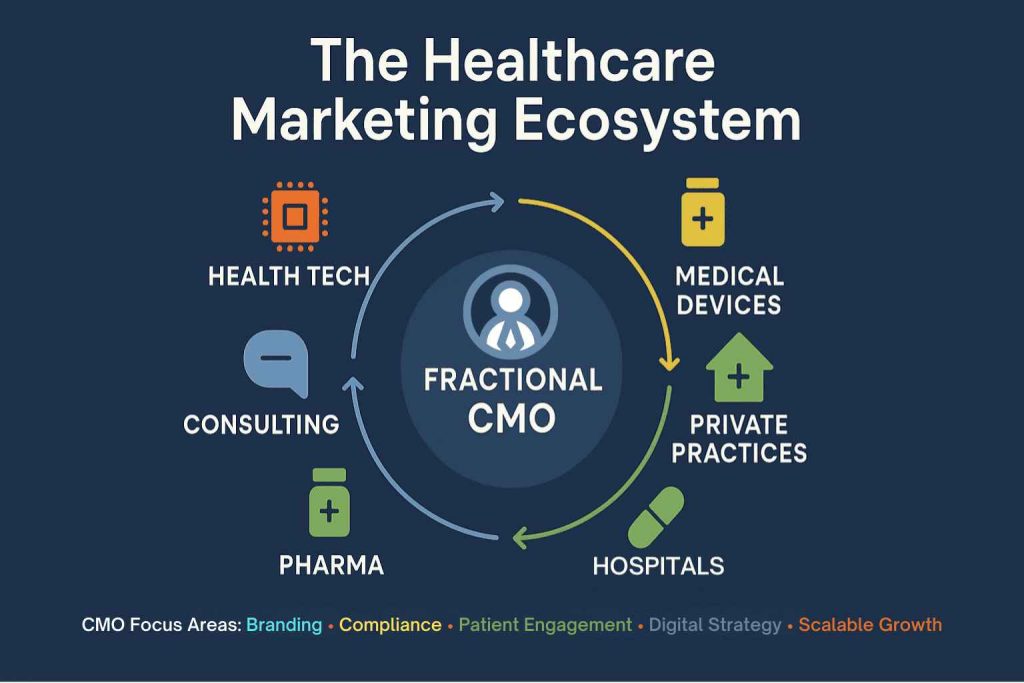
Evidence-Based Impact of Fractional CMOs in Healthcare and Related Sectors
Cost Efficiency and Resource Optimization
One of the greatest advantages of engaging a fractional CMO for healthcare is cost efficiency. Organizations can reduce executive marketing leadership expenses by 40–60 percent compared to hiring a full-time CMO with salary, benefits, and bonuses. In healthcare, where margins are slim and budgets are tightly monitored, these savings are vital. It often determines whether organizations scale strategically or stall.
Return on Investment and Growth Outcomes
Surveys show businesses engaging fractional CMOs achieve strong ROI. Many recover the investment quickly through patient acquisition, referral growth, and payer adoption. Across industries, organizations report double-digit gains in lead generation and conversions after adding fractional leadership. In healthcare, this translates into measurable increases in patient volumes, referrals, and faster hospital contracts with lower spend.
Faster Market Traction
Startups often cite the speed advantage of fractional leadership. Engaging a seasoned CMO part-time accelerates positioning, messaging, and compliant campaign execution. This can fast-track adoption by months, limiting competitive risk. In healthcare, where launching a medical device or digital health solution demands precise clinical and payer alignment, faster traction directly supports long-term viability.
Reduced Acquisition Costs
Organizations adopting the fractional model often improve acquisition efficiency. Studies show 20–40 percent reductions in customer or patient acquisition cost when senior executives lead strategy instead of fragmented consultants or junior teams. For hospitals, this means lower cost per patient acquired. Provider networks also benefit through stronger retention and sustainable growth.
Enhanced Internal Capability
Another key benefit of the fractional CMO model is capacity building. Unlike outside consultants, they embed within organizations and mentor internal teams. Businesses often emerge with stronger marketing operations as staff adopt strategic frameworks and execution standards. In healthcare, this guidance is critical for teams skilled tactically but inexperienced with regulatory and payer-driven constraints.
Broad Industry Validation
The adoption of fractional leadership is no longer niche. Surveys show rising numbers of startups and mid-market firms engaging fractional CMOs. Board and investor acceptance has grown, with many viewing fractional executives as a strategic alternative to permanent hires. In healthcare, this matters as investors now expect commercial traction alongside clinical milestones.
The Future of Fractional Leadership in Healthcare
Growing Demand Across Healthcare Sectors
Rising healthcare spending and competition increase pressure for commercial results. Medical device firms face rapid innovation, health tech startups must secure adoption quickly, and providers are judged on value-based care. The demand for healthcare marketing experts who deliver without permanent overhead is growing. For many, the fractional model offers scalable leadership without structural risk.
Alignment With Industry Trends
Several macro-trends are reinforcing the importance of fractional leadership:
- Value-Based Care: Marketing must not only highlight clinical quality but also demonstrate measurable outcomes that align with payer and provider expectations.
- Digital Transformation: As organizations expand investment in SEO, GEO, paid media, and multichannel campaigns, leadership is required to ensure consistency and compliance across platforms.
- Health Tech Competition: Startups entering crowded spaces cannot rely on product differentiation alone. Disciplined positioning, storytelling, and market education are essential.
- Resource Efficiency: Budgets are under scrutiny. The fractional marketing consultant serving as CMO ensures strategic spend rather than scattershot campaigns.
These trends demonstrate why a fractional healthcare CMO is not just a stopgap solution but a strategic requirement for organizations facing evolving market conditions.
Integration With Agencies and Consultants
The future of fractional leadership is increasingly collaborative. As marketing grows more specialized, no single executive can cover all channels or tactics. Instead, the fractional CMO agency becomes a hub of orchestration, aligning the efforts of specialized vendors:
- Healthcare consulting firms may advise on organizational transformation or payer strategies.
- Healthcare strategy consultants may provide in-depth insights into reimbursement models.
- Creative agencies may execute design, branding, and campaigns.
- Digital firms may focus on channel-specific expertise, from LinkedIn Ads to TikTok Ads.
The role of the fractional CMO services provider is to ensure that all these groups work toward a unified strategic objective. Without this central leadership, organizations risk fragmentation, wasted spend, and diluted impact.
Frequently Asked Questions
What is a Fractional CMO in Healthcare?
A fractional CMO is a senior marketing leader who works with healthcare organizations on a part-time or contract basis. They provide executive-level strategy while ensuring alignment with growth, patient engagement, and regulatory compliance. Unlike general marketing roles, this position requires expertise in clinical communication and payer-provider dynamics, giving startups, growth-stage firms, and provider networks access to high-level guidance without the cost of a full-time hire.
How does a fractional CMO differ from a healthcare marketing consultant?
The distinction lies in scope and leadership responsibility:
- Consultants: Provide tactical or project-specific execution.
- Fractional CMOs: Lead strategy, oversee teams, and align efforts across departments.
Can a fractional CMO help medical device companies?
Yes, especially during commercialization and FDA-regulated launches:
- Navigate regulatory requirements.
- Craft clinician-focused, evidence-based messaging.
- Coordinate launches with sales and distributor networks.
How does a fractional CMO support health tech companies?
Health tech firms often face adoption and trust challenges, and a fractional leader can:
- Create ROI-driven messaging for payers.
- Educate patients and clinicians on product use.
- Ensure integration messaging for hospitals and IT teams.
What are the benefits of hiring a healthcare fractional CMO?
Key advantages extend beyond marketing campaigns:
- Access to executive expertise at reduced cost.
- Scalable engagement models.
- Cross-functional alignment across compliance, sales, and marketing.
- Mentorship for internal teams.
What KPIs should organizations expect from a fractional CMO?
Success is measured by healthcare-specific indicators:
- Patient acquisition cost (PAC) and lifetime value.
- Referral volume growth.
- Market share expansion.
- Brand trust scores.
- Compliance benchmarks.
How is a fractional chief medical officer different from a fractional CMO?
A fractional chief medical officer focuses on clinical oversight and patient safety, while a fractional CMO drives marketing, branding, and growth. Together, they align medical integrity with market strategy.
Final Thoughts on Fractional Leadership
Fractional leadership is not a compromise but a strategic model built for the realities of healthcare. From startups to established providers, organizations have shown that fractional executives achieve measurable results without the costs of permanent overhead. Hospitals have repositioned brands, device companies have launched products with compliance and clarity, and health tech startups have proven value to payers. In each case, the fractional CMO for healthcare bridges innovation and adoption.
This model works because healthcare demands specialization, adaptability, and trust. Full-time executives are not always practical, yet the absence of senior leadership risks wasted resources and missed opportunities. A fractional healthcare CMO resolves this challenge by offering a scalable strategy, accountability, and mentorship. By aligning with agencies and consultants, they create a blended approach that ensures marketing remains strategic, compliant, and credible while supporting sustainable growth.
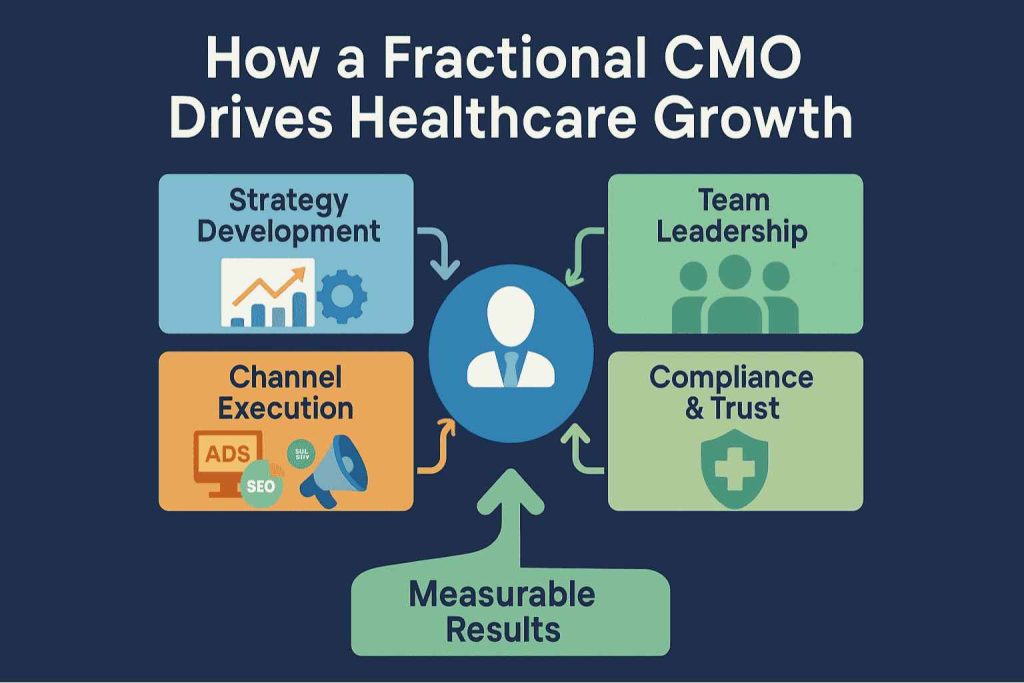
Why Partner With RiseOpp
RiseOpp partners with healthcare organizations, medical device firms, and health tech startups to bridge the gap between strategy and execution. By combining fractional leadership with disciplined execution, we help marketing move beyond campaigns to become a measurable driver of growth.
What makes our approach unique is the balance of executive leadership and tactical activation. We deliver fractional CMO services that include strategic positioning, messaging, and growth roadmaps, while also supporting execution across diverse channels such as SEO, PR, Google Ads, Meta Ads, LinkedIn Ads, TikTok Ads, email, and affiliate marketing.
For healthcare organizations, the impact is clear. Campaigns resonate with patients, providers, and payers while staying fully compliant with HIPAA, FDA, and CMS regulations. Our proprietary Heavy SEO methodology further boosts visibility, allowing clients to dominate search rankings across tens of thousands of healthcare-specific keywords.
By choosing RiseOpp as your fractional CMO agency, you gain both senior-level strategic leadership and the operational discipline needed to thrive in regulated markets. Whether you are launching a new medical device, scaling a health tech platform, or repositioning a provider network, we align marketing strategies with growth, compliance, and trust.
If your organization is ready to strengthen marketing leadership without the cost of a full-time executive, RiseOpp’s fractional CMO services provide the expertise, flexibility, and structure to build sustainable advantage and measurable results in healthcare and beyond.
Comments are closed